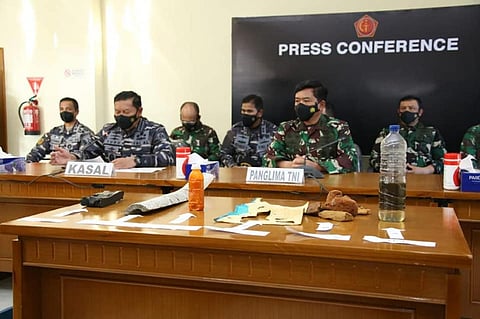

Indonesian search and recovery teams have found debris believed to have originated from the submarine KRI Nanggala, which disappeared in the Bali Strait on Wednesday, April 21.
Defence officials in Jakarta said the recovered debris could not have come from any source other than Nanggala, one of two Cakra-class diesel-electric submarines in Indonesian service.
Among the items that were found floating on the surface near Nanggala's last reported position were a part from a submarine's torpedo system, a bottle of periscope lubricant, and a Muslim prayer mat.
Nanggala last made radio contact at 03:00 local time on Wednesday while conducting drills some 100 kilometres off Bali.
The submarine may have suffered damage to its torpedo tubes at the time of its disappearance, Indonesian Navy chief of staff Admiral Yudo Margono said in a press conference on Saturday, April 24.
Margono added that the search for Nanggala will continue despite the recovery effort being made "very risky and difficult" by the area's water depths, some reaching as much as 850 metres.
Officials had earlier said the submarine's oxygen supply would be fully exhausted after 72 hours, leaving little possibility that there will be any survivors among the 53 crewmembers on board.
Other countries including the United States, Australia, India, and Singapore have pledged assistance in the search for Nanggala. Among the assets that are being deployed in the search effort are the Royal Australian Navy ships HMAS Ballarat and HMAS Sirius, the Republic of Singapore Navy submarine rescue ship Swift Rescue, and a US Navy P-8 Poseidon maritime surveillance aircraft.
